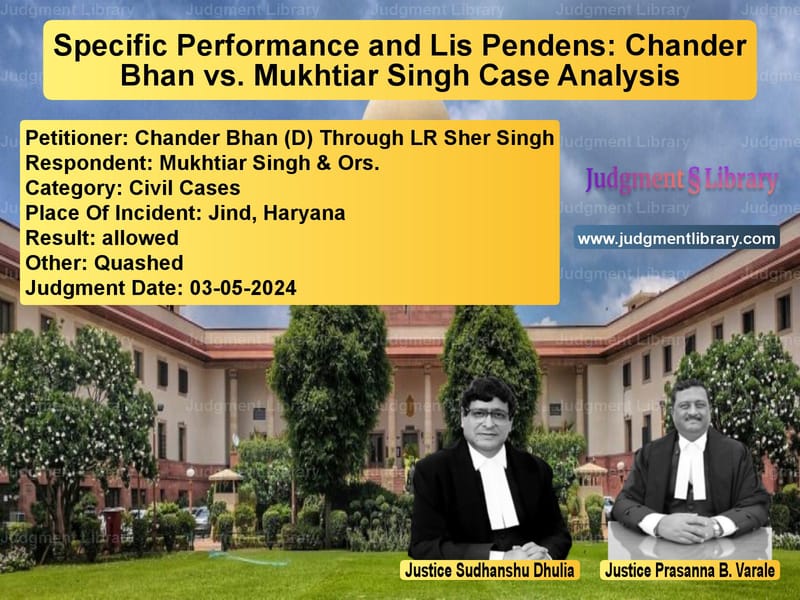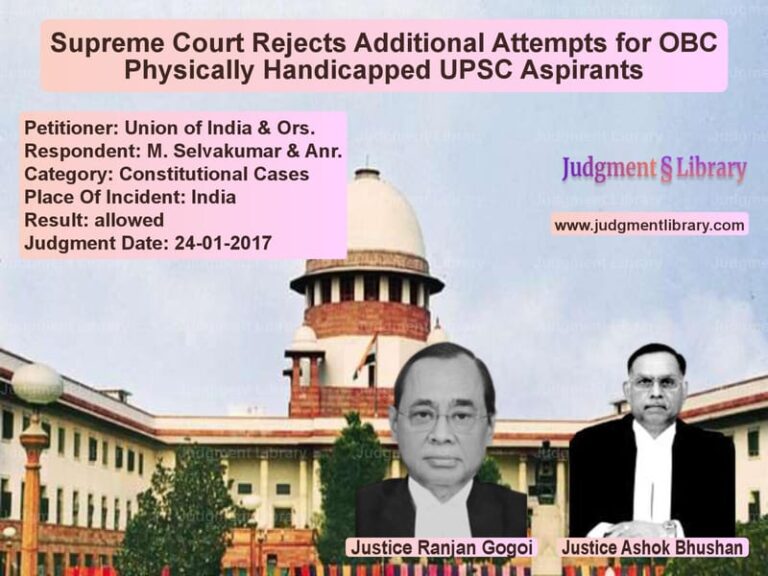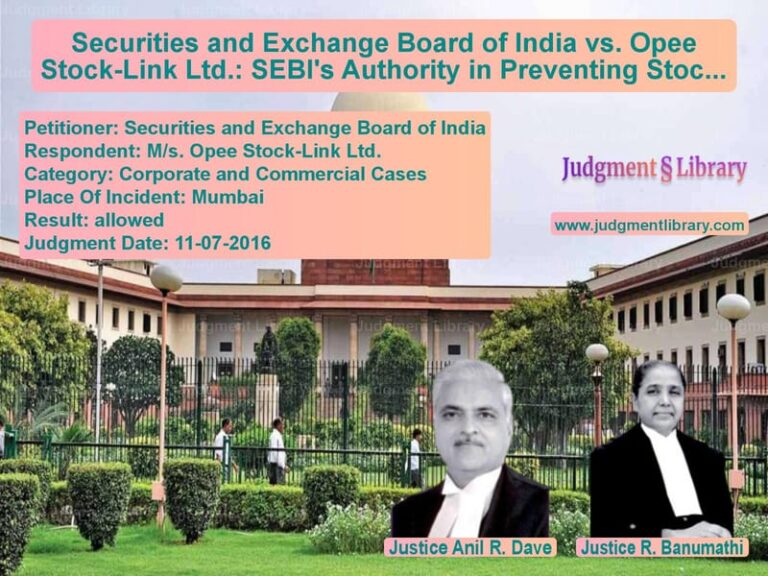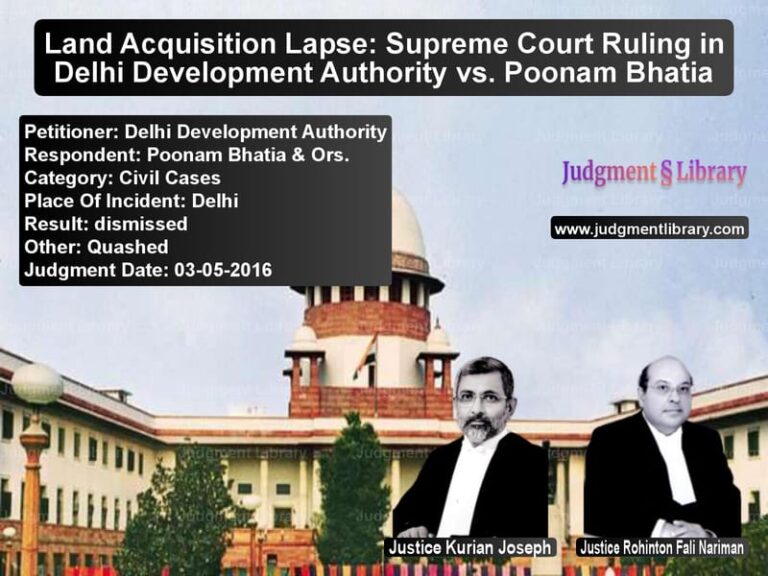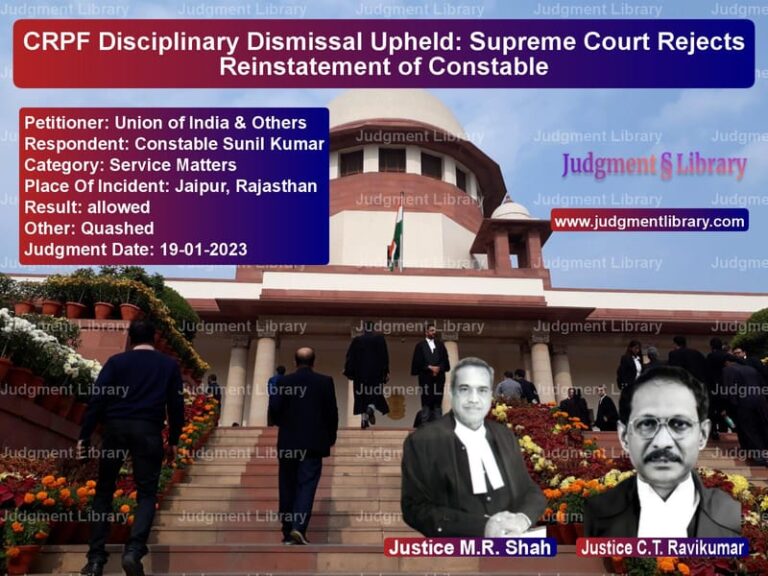Specific Performance and Lis Pendens: Chander Bhan vs. Mukhtiar Singh Case Analysis
The case of Chander Bhan (D) Through LR Sher Singh vs. Mukhtiar Singh & Ors. revolves around the doctrine of lis pendens and the rights of a bona fide purchaser under Section 41 of the Transfer of Property Act, 1882. The Supreme Court of India, in its judgment, set aside the decision of the Punjab and Haryana High Court and upheld the decree for specific performance, emphasizing that property transactions made during the pendency of a suit cannot defeat the rights of the plaintiff.
The case highlights crucial legal principles regarding the validity of property transfers during litigation and the obligations of parties entering into sale agreements. The Supreme Court’s ruling clarifies the application of Section 52 (lis pendens) and Section 41 (bona fide purchaser) of the Transfer of Property Act, providing valuable jurisprudence on property law.
Background of the Case
The dispute arose from an agreement to sell executed on 10th November 2002 between the appellant, Chander Bhan, and respondent No. 3 for 16 kanals of land. The total sale consideration was agreed at Rs. 8 lakhs, with an advance payment of Rs. 2.5 lakhs. The remaining amount of Rs. 5.5 lakhs was to be paid at the time of executing the sale deed, which was scheduled for 10th November 2004.
However, before the execution of the sale deed, the appellant learned that respondent No. 3 was attempting to alienate the property. In response, the appellant filed a suit for permanent injunction on 21st July 2003 to prevent the transfer of the property. The trial court granted a temporary injunction on 28th July 2003, restraining respondent No. 3 from selling the land.
Despite this order, respondent No. 3 executed a release deed in favor of his son, respondent No. 4, on 28th July 2003. Subsequently, respondent No. 4 sold the land to Mukhtiar Singh and Baljeet Singh (respondents No. 1 and 2) through a registered sale deed dated 16th June 2004.
Legal Proceedings
Trial Court
The appellant filed a suit for specific performance before the Additional Civil Judge, Senior Division, Jind, as respondent No. 3 failed to execute the sale deed by the agreed date. The defendant (respondent No. 3) claimed that he had signed the agreement under a misconception, alleging fraud by the appellant.
The trial court, however, decreed the suit in favor of the appellant, holding that respondent No. 3 had admitted to executing the agreement in the earlier injunction suit. Further, an adverse inference was drawn against respondents No. 3 and 4 for refusing to testify. The court directed respondent No. 3 to execute the sale deed upon receiving the balance sale consideration.
First Appellate Court
Respondents No. 1 and 2 appealed against the trial court’s order, but the Additional District Judge, Jind, dismissed their appeal on 6th March 2012. The court reaffirmed that the sale deed in favor of respondents No. 1 and 2 was executed in violation of the temporary injunction and the principle of lis pendens.
High Court
Respondents No. 1 and 2 filed a second appeal before the Punjab and Haryana High Court, which was allowed on 3rd October 2019. The High Court reversed the findings of the lower courts and dismissed the suit for specific performance, instead granting the appellant a refund of the earnest money with interest.
Key Arguments
Petitioner (Chander Bhan)
- The transfer of the property was made during the pendency of the suit, violating the doctrine of lis pendens under Section 52 of the Transfer of Property Act.
- Respondents No. 1 and 2 were not bona fide purchasers since they were aware of the pending litigation.
- The trial court and first appellate court had correctly decreed specific performance, and the High Court erred in reversing their findings.
Respondents (Mukhtiar Singh & Ors.)
- They were bona fide purchasers who had conducted due diligence and found no record of the pending suit in the revenue records.
- The doctrine of lis pendens did not apply since the injunction suit was later withdrawn.
- They had made substantial investments in the land, further strengthening their claim.
Supreme Court Judgment
The Supreme Court overturned the High Court’s ruling, reinstating the decree for specific performance. The Court held:
“Once it has been held that the transactions executed by the respondents are illegal due to the doctrine of lis pendens, the defense of respondents 1-2 that they are bona fide purchasers for valuable consideration is liable to be rejected.”
The Court emphasized that transfers made during the pendency of a suit are subject to the final decree, and bona fide purchaser protection under Section 41 does not apply in such cases. The Court directed respondent No. 3 to execute the sale deed in favor of the appellant within three months.
Legal Principles Established
- Doctrine of Lis Pendens: Any transaction made while litigation is pending is subject to the outcome of the case.
- Bonafide Purchaser Protection: A purchaser must take reasonable care and act in good faith to claim protection under Section 41.
- Specific Performance: Courts will enforce agreements to sell when the plaintiff demonstrates readiness and willingness to perform contractual obligations.
Conclusion
This judgment underscores the importance of adhering to contractual obligations and respecting the legal principle of lis pendens. The Supreme Court’s decision ensures that property transactions during litigation do not defeat the rights of an earlier purchaser. The ruling also provides clarity on the rights of bona fide purchasers and emphasizes the need for due diligence before acquiring property.
Petitioner Name: Chander Bhan (D) Through LR Sher Singh.Respondent Name: Mukhtiar Singh & Ors..Judgment By: Justice Sudhanshu Dhulia, Justice Prasanna B. Varale.Place Of Incident: Jind, Haryana.Judgment Date: 03-05-2024.
Don’t miss out on the full details! Download the complete judgment in PDF format below and gain valuable insights instantly!
Download Judgment: chander-bhan-(d)-thr-vs-mukhtiar-singh-&-ors-supreme-court-of-india-judgment-dated-03-05-2024.pdf
Directly Download Judgment: Directly download this Judgment
See all petitions in Contract Disputes
See all petitions in Property Disputes
See all petitions in Specific Performance
See all petitions in Judgment by Sudhanshu Dhulia
See all petitions in Judgment by Prasanna Bhalachandra Varale
See all petitions in allowed
See all petitions in Quashed
See all petitions in supreme court of India judgments May 2024
See all petitions in 2024 judgments
See all posts in Civil Cases Category
See all allowed petitions in Civil Cases Category
See all Dismissed petitions in Civil Cases Category
See all partially allowed petitions in Civil Cases Category

